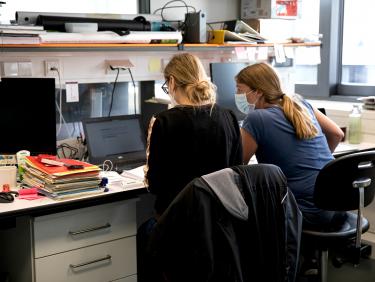Master-Studium
The international master program in Molecular Biosciences at the University of Heidelberg starts each year in October and lasts 2 years (4 semesters).
The 1st semester consists of two modules “Frontiers of Biosciences I & II”, which provide a solid background in advanced biosciences. Each module lasts 9 weeks, of which 5-6 weeks you spend in course work and 3 weeks are intended for exam preparation.
The formal course work for each module consists of a lecture with accompanying tutorial and a practical course with accompanying literature seminar. There are written examinations at the end of each lecture.
The modules “Focus Biosciences I & II” in the 2nd semester have a similar structure, whereas the teaching is specific to the appropriate major and provides a wide choice of practical courses.
In the 3rd semester you attend the modules “Biolab” and “Working in Biosciences”. During these modules you undertake lab rotations, working for 6-8 weeks on your own project in the laboratory of your choice. It is possible to do these lab rotations during the semester breaks and thus complete the master program within 18 months.
During the last 4th semester you are working for 6 months on your master thesis, which has to be defended at the end.


Frontiers of BioScience I & II
The modules “Frontiers of Biosciences I & II” are shared by all Majors of the Master Molecular Biosciences and cover a wide variety of topics to provide you a solid background in advanced biosciences. For the specific curricula of the different Majors see their specific pages.

Frontiers of BioScience II - Lectures
The lecture of Frontiers of BioScience II starts with a common mandatory week covering essential scientific core competencies. The module is completed by at least two self-chosen Major modules. Major modules with the same numbering take place in parallel.

Developmental and Stem Cell Biology Major
The development of a living organism from a single cell is a spectacular process. It represents a masterpiece of temporal and spatial coordination of gene expression, of cellular events and communication between many different cell and tissue types.
Aim of research and teaching in the Major „Developmental and Stem Cell Biology“ is to gain understanding of the mechanisms that guide a fertilized egg and the resulting daughter cells through cell divisions and complex morphogenetic rearrangements, with crucial checkpoints in time and space to ultimately emerge the body axes as well as complex structures such as eyes, brain or flowers. The structures of the adult organism need not only to be established, but are also maintained throughout adult life by the activity of stem cells in their respective niches.
Organismal development and the role of stem cell mediated growth and homeostasis is in the research focus of the scientists participating in the Major „Developmental and Stem Cell Biology“.
Molecular and Applied Plant Sciences (MAPS)
Plants do not only provide the food, feed, shelter and energy to sustain our growing global population, they are also fascinating objects for basic research that aims at understanding the principles of life.
The major Molecular and Applied Plant Sciences (MAPS) is a research-oriented degree program that provides students with an understanding of the manifold life processes in plants at biochemical, molecular, cellular and physiological levels. The focus of the program is on the in-depth scientific investigation of the molecular mechanisms that control the processes of plant development and adaption to the environment as well as how to translate this knowledge to applications.
Heidelberg is home to a very active community of plant researchers that are based at the Centre for Organismal Studies (COS). All researchers involved in MAPS are world renowned leaders in their fields and addresses the global challenges of food security, green technology and climate change. The range of topics studied is wide: sulfur biochemistry, cell wall biology, cellular transport and trafficking systems, stem cell behaviour, root development and plant defences. In this research environment, MAPS has developed into an internationally distinguished master program that provides students from around the world with a high-level education at one of the leading universities in Germany. The MAPS curriculum covers a broad spectrum of topics and is integrally taught in English. The program is focused on intensive stays in the labs. Already by the second semester students spend most of their time actively doing research. The lectures and practical allow students to study the biochemistry, cell biology, physiology or developmental biology of plants using advanced equipment for high-end microscopy, genomics, transcriptomics and metabolomics. A key strength of the program is the international network of academic and industrial host labs that the program has built over the years. This offers many opportunities to our students to discover an even wider range of topics and methodologies.
MAPS students are internationally selected and form a small (max. 12) group fully embedded into the scientific life of the COS. Compared to other curriculums, MAPS students benefit from an inverted ratio of lecturers to students, leading to high quality mentoring of their progression.
Over the last 10 years, MAPS alumni have followed exemplary career paths in and outside of academia, illustrating that MAPS training will not only qualify you for an academic career (in plant and in non-plant research areas) of the life sciences but also in the industry. Our alumni additionally secured job opportunities in management, policy and communication in governmental and non-governmental organisations or scientific journalism.
Other majors
The majors „Neuroscience“ and „Systems biology“ are conducted in cooperation with partners. Please see the respective homepages.


